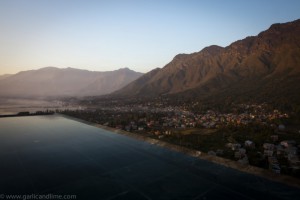Since the Great Depression in the 1930s we have defined the progress of countries based on their Gross Domestic Product (GDP). We determine progress based only on wealth. We don’t look at social progress: the distribution of that wealth, the investment in education or healthcare, or the health and well being of the populations.
By focusing only on Gross Domestic Product as the standard of success in our global economy, we give ourselves a passing grade if the top 100 people in the county gets wealthier, or a lot wealthier. GDP counts bombs and prisons as progress. It counts overeating and over consuming as progress. It ignores environmental impact. It ignores whether the population is happy, and even whether their basic needs are being met.
This counting ourselves rich while we make ourselves poor is something I have been thinking about for a while, and also talking about with some friends for a while. We need to change the metric for success. We need to move away from measuring wars and pollution as success.
The Social Progress Index as an alternative
The Social Progress Index offers an alternative to GDP as a goal for nations to aspire to. It measures progress along 3 axis:
- Basic human needs – Nutrition and basic medical care, water and sanitation, shelter and personal safety
- Foundations of well being – Access to basic knowledge, access to information and communications, health and wellness, ecosystem sustainability
- Opportunity – personal rights, personal freedom and choice, tolerance and inclusion, access to advanced education
The 2015 Social Progress Index Results
In the 2015 Social Progress Index Results, the Top 5 reads like a list of one of the “best places in the world to live”. #1 Norway, #2 Sweden, #3 Switzerland, #4 Iceland, #5 New Zealand. In fact, the recently published list of the happiest countries in the world in the UNs World Happiness Report is remarkably similar – #1 Switzerland, #2 Iceland, #3 Denmark, #5 Norway, #5 Canada (Canada was #6, Sweden #8 on the social progress index, Denmark is #8 and New Zealand is #9 in the happiest countries in the world list).
What this shows is that these countries have not only focused on GDP growth (in fact New Zealand’s GDP per capita is modest when compared to some other countries), but have had a focus on the welfare of their people, and the result is social progress and societal happiness. With universal literacy, welfare states, and universal health care, the basic human needs of (almost) all the population is taken care of.
These countries also score highly on personal rights and freedoms. Canada and New Zealand score highest on Opportunity, and surely the efforts both of these countries have made in redressing the rights of the aboriginal populations of these countries (not saying it is perfect yet, but they are making efforts compared to other countries) has contributed here too.
Outside the top 5 what does the data show?
What else the data shows is actually quite interesting. It shows that increases in GDP only translates directly into improvements in Social Progress when the country has a GDP lower than $10,000 per capita. Once GDP per capita goes above this level, GDP becomes a poor indicator of social progress. We see the same relationship with happiness. Once your basic human needs have been met, each salary increase has a diminishing return on how happy you are, and above a certain point, it even makes you less happy, less satisfied with life.
Once an economy has reached this threshold level, it depends on what they invest this wealth in to how the society progresses. The United States is an interesting case in this point. Without the universal healthcare and access to quality education that you find in the Nordic countries, it scores lower on Social Progress, relative to its wealth. Or Kuwait, with the highest levels of GDP per capita, but with lower levels of Social Progress than Costa Rica, with far lower GDP levels.
So what?
So how do we move to a world metric where we define success based on the social progress of a nation? How do we get politicians to be interested in the basic human needs of its population and not just the total wealth number? How do we get economies to invest in healthcare, education and equality of distribution of wealth as a key to success? How do we redefine success to one that does not include bombs and prisons in the metric of success?
I don’t know. That is the million dollar question. But having a different metric available, a different measurement system. Starting a conversation about how this alternative measures something more meaningful and sustainable can only help.
You can watch the full Ted Talk by Michael Green on What the Social Progress Index can Reveal about Your country below
You might also like:





